PRINCETON, NJ -- Republicans are significantly more likely than Democrats or independents to rate their mental health as excellent, according to data from the last four November Gallup Health and Healthcare polls. Fifty-eight percent of Republicans report having excellent mental health, compared to 43% of independents and 38% of Democrats. This relationship between party identification and reports of excellent mental health persists even within categories of income, age, gender, church attendance, and education.
The basic data -- based on an aggregated sample of more than 4,000 interviews conducted since 2004 -- are straightforward.
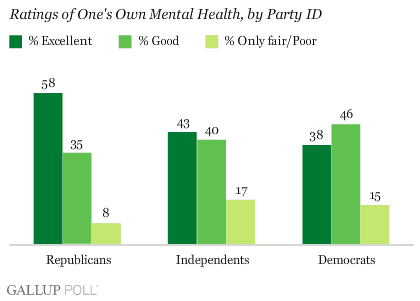
The differences are quite significant, as can be seen. While Democrats are slightly less likely to report excellent mental health than are independents, the big distinctions in these data are the differences between Republicans and everyone else.
One could be quick to assume that these differences are based on the underlying demographic and socioeconomic patterns related to party identification in America today. A recent Gallup report (see "Strong Relationship Between Income and Mental Health" in Related Items) reviewed these mental health data more generally, and found that men, those with higher incomes, those with higher education levels, and whites are more likely than others to report excellent mental health. Some of these patterns describe characteristics of Republicans, of course.
But an analysis of the relationship between party identification and self-reported excellent mental health within various categories of age, gender, church attendance, income, education, and other variables shows that the basic pattern persists regardless of these characteristics. In other words, party identification appears to have an independent effect on mental health even when each of these is controlled for.
The accompanying graphs display the relationship between party identification and self-reported mental health crossed by categories of a number of relevant variables. In almost all cases, Republicans are more likely to report excellent mental health across the various categories.
For example, Republicans are significantly more likely to report excellent mental health than are independents or Democrats among those making less than $50,000 a year, and among those making at least $50,000 a year. Republicans are also more likely than independents and Democrats to report excellent mental health within all four categories of educational attainment.
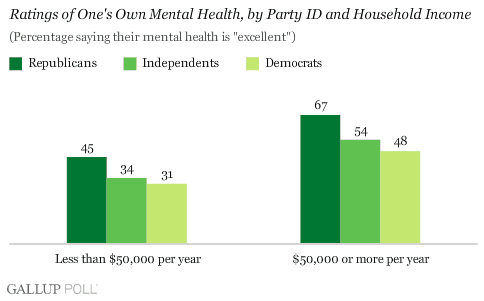
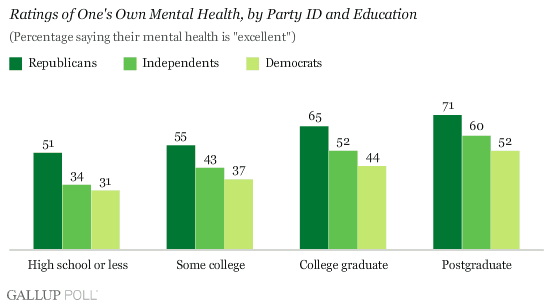
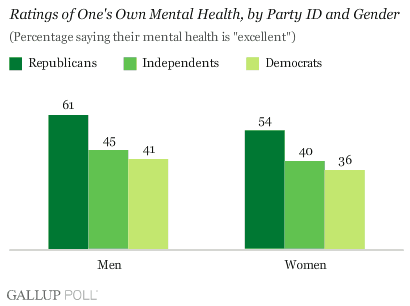
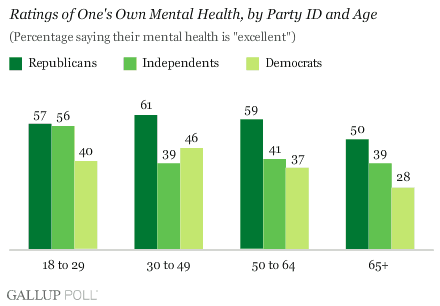
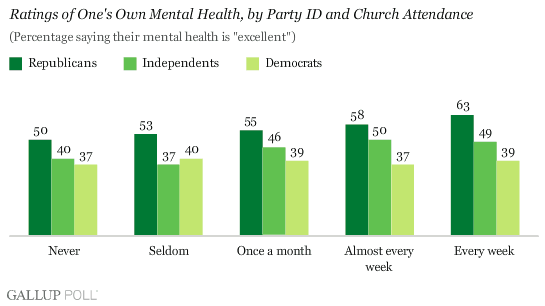
Gallup also conducted a separate multivariate analysis that looked at the impact of a list of variables -- including party identification -- on self-reported mental health. This analysis showed that even when the impact of these other variables is controlled for statistically, there is an independent and highly significant impact of being a Republican on mental health.
The accompanying table displays the result of this analysis, showing the regression coefficients that represent the relationship of each variable to mental health while controlling for the other variables in the model. (Coefficients marked with an asterisk are significant at the .000 level.)
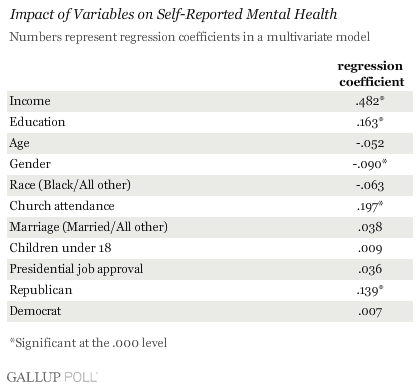
The table shows that income, education, gender, church attendance, and being a Republican are significantly related to self-reported mental health -- each such relationship occurring even when the impact of the other variables is taken into account.
Discussion
What are the implications of these findings?
Correlation is no proof of causation, of course. The reason the relationship exists between being a Republican and more positive mental health is unknown, and one cannot say whether something about being a Republican causes a person to be more mentally healthy, or whether something about being mentally healthy causes a person to choose to become a Republican (or whether some third variable is responsible for causing both to be parallel).
Previous analysis (see Related Items) shows that a number of variables are related to self-reported mental health -- including, in particular, income. Because Republicans have on average higher incomes than independents or Democrats, part of the explanation for the relationship between being a Republican and having better mental health is a result of this underlying factor. The same is true for several other variables.
But the key finding of the analyses presented here is that being a Republican appears to have an independent relationship on positive mental health above and beyond what can be explained by these types of demographic and lifestyle variables. The exact explanation for this persistent relationship -- as noted -- is unclear.
Survey Methods
Results are based on an aggregated sample of telephone interviews with 4,014 national adults, aged 18 and older, conducted in November 2004, November 2005, November 2006, and November 2007. For results based on the total aggregated sample of national adults, one can say with 95% confidence that the maximum margin of sampling error is ±2 percentage points. The margin of error for smaller subsamples reported in this analysis will be larger.
In addition to sampling error, question wording and practical difficulties in conducting surveys can introduce error or bias into the findings of public opinion polls.
